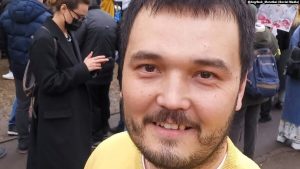An Almaty court has ordered Aqylbek Muratbai, an outspoken Karakalpak activist, to be held in custody for 40 days while Astana decides whether to fulfill an extradition request made by the government of Uzbekistan. Muratbai, who holds an Uzbek passport but has lived in Kazakhstan for more than a decade, was detained on February 15 by plainclothes Kazakh police at around 10 p.m., according to his partner, who spoke to RFE/RL. Vienna-based Freedom for Eurasia, a rights group, issued a statement on February 15 in which it claimed that Muratbai’s arrest was led by a Uzbek police official, Muhamedin Baimurzaev.
Muratbai has become a significant voice for the Karakalpak people in the nearly two years since violence broke out in Nukus, the capital of the Republic of Karakalpakstan, in July 2022 after Tashkent had proposed a constitutional change that would have eliminated the autonomous republic’s sovereignty. While Uzbekistan quickly walked the proposed changes back, Tashkent has spared no effort in pursuing serious charges against those who opposed the proposal. More than 60 civilians have been charged in Uzbekistan in connection with the 2022 Karakalpakstan protests, most of them in a pair of trials of January and March 2023.
But the Uzbek authorities have looked beyond the borders of Uzbekistan and Karakalpakstan for targets, including two trials in absentia of Aman Sagidullayev and Nietbay Urazbayev in May 2023. Sagidullayev has political asylum in Norway, but Urazbayev lived in Kazakhstan. Even though he had obtained Kazakh citizenship, Urazbayev told The Diplomat last year that he was nevertheless worried that the Uzbek authorities would find some way to get him. Urazbayev died in Almaty in early January 2024, a month after being notified that he was being stripped of his Kazakh citizenship.
Between September and November 2022, Kazakh authorities had detained at least five Karakalpak activists in Kazakhstan – Ziuar Mirmanbetova, Koshkarbai Toremuratov, Zhangeldi Dzhaksymbetov, Raisa Kudaibergenova, and Tleubike Yuldasheva – all of whom where Uzbek citizens. Ultimately, none was extradited and all five were released after a full year in detention. The Kazakh authorities, however, denied asylum requests from some of the activists, underscoring the precarious position Kazakhstan finds itself in between the Karakalpaks and the Uzbeks.
Muratbai’s detention fits this pattern, but he has arguably been far more outspoken in the English-language press than the others previously detained, drawing attention to an issue of great discomfort for Tashkent.
Muratbai had been involved in the Karakalpak community in Kazakhstan since 2013. He engaged exclusively in labor migrant issues and cultural events – “No politics” – until 2022 when the arrest of a friend triggered a transformation.
“That night, when Koshkarbai [Toremuratov] was taken away, I decided for myself that I no longer had the moral right to remain silent and that I must actively report on the violations of the rights of ethnic Karakalpaks by the Uzbek authorities,” Muratbai explained in a December 19, 2023 post on X, formerly Twitter.
In the same post, and in comments to The Diplomat in January 2024, Muratbai stressed that “further persecution” of Karakalpak activists “will only lead to the exacerbation of the situation in Karakalpakstan and to the strengthening of the Karakalpak national movement”:
Those who have been silent will start speaking anonymously. Those who have already spoken anonymously will start to act openly. Those who have been speaking openly will, in the best case, start to do so louder and more often, and in the worst case (which is already being observed) will finally get tired of waiting for dialogue with the Mirziyoyev regime in Uzbekistan and will start to call for more radical actions in the struggle for the independence of Karakalpakstan.
Importantly, Muratbai never called for “more radical action” – indeed, he called that the “worst case” scenario – but that nuance is entirely lost on Tashkent.
Muratbai’s sister, Fariza Narbekova, told Vlast.kz that her brother is being charged with public calls for mass disorder and violence (Article 244 part 2 of the Criminal Code of Uzbekistan) and production or demonstration of materials containing a threat to public safety (Article 244-1 part 3).
Mary Lawlor, U.N. Special Rapporteur on human rights defenders, posted on X after Muratbai’s detention, calling it “disturbing news.” She highlighted that he is at risk of refoulement. Frontline Defenders, a rights group focused on human rights defenders, said, “Given the scope of the current repression against vocal critics of Uzbekistan’s policy towards Karakalpakstan, if extradited, Aqylbek Muratbai could face a severe prison sentence.”






























